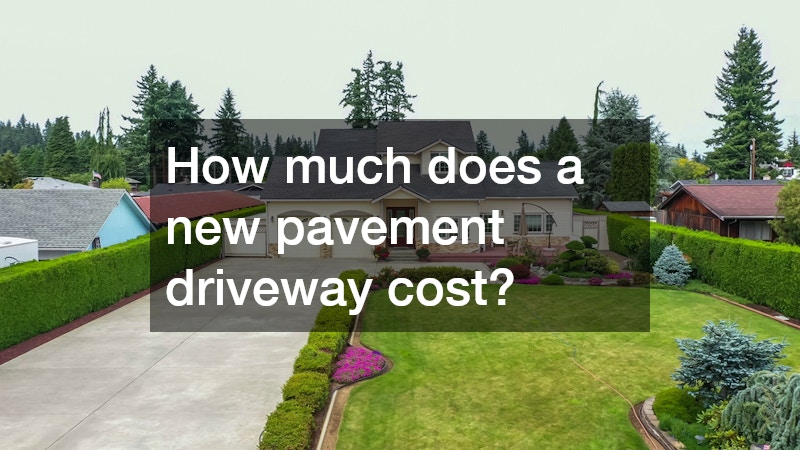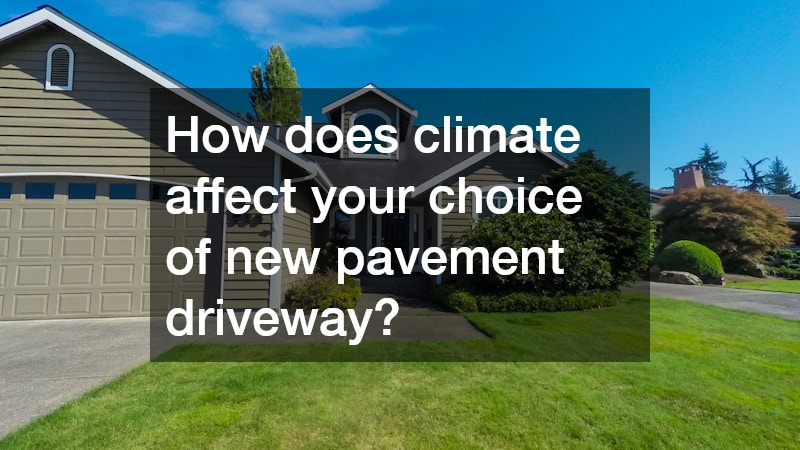A driveway is more than just a place to park your car—it’s a vital component of your home’s exterior that affects functionality, curb appeal, and long-term property value. Alongside complementary services like garage door repairs, the right driveway can transform your home’s appearance and convenience. Choosing the right material for a driveway is a significant decision that should account for durability, appearance, maintenance, and environmental considerations. For many homeowners, a new pavement driveway offers a practical, visually appealing, and long-lasting solution. This article explores whether a new pavement driveway is right for you by breaking down the benefits, comparing materials, evaluating costs, and considering both installation and maintenance. What are the benefits of a new pavement driveway?
What are the benefits of a new pavement driveway
Longevity and Durability
Pavement driveways are well-known for their long-lasting performance. A professionally installed driveway can last several decades, especially when the right materials and installation methods are used. A skilled paving contractor will ensure that the foundation is properly prepared and the materials applied are suitable for the climate and soil conditions. These driveways are designed to withstand the pressure of daily vehicle traffic, harsh weather changes, and years of wear and tear without significant damage.
Aesthetic Appeal
The visual appeal of pavement is another major benefit. Whether you opt for classic asphalt or decorative pavers, you can achieve a sleek, attractive appearance that enhances the exterior of your home. Smooth finishes and customizable borders provide homeowners with various design options. Pavers, in particular, offer versatility and can be arranged in patterns that complement the home’s architecture, while also improving traction and drainage.
Increased Property Value
A new pavement driveway adds real value to a property. Potential buyers often view a clean, professionally paved driveway as an indicator of overall home maintenance. Investing in quality paving work and timely driveway sealing can significantly boost the resale price of your home. Additionally, a well-paved area allows for smooth transitions between your driveway, garage door, and entryway, creating a cohesive and appealing look.
Low Maintenance Costs
Compared to gravel or unsealed concrete, a new pavement driveway is easier and more cost-effective to maintain. Regular driveway sealing helps protect the surface from moisture, UV rays, and automotive fluids. Small cracks and imperfections are typically easy to address, especially when caught early. Reputable asphalt companies often offer maintenance services to keep your pavement in excellent condition year-round.
Weather Resistance
Pavement holds up well under various weather conditions. It resists damage from UV exposure, heavy rainfall, and freezing temperatures better than many alternative surfaces. Proper grading and drainage help mitigate water pooling and erosion, while the correct use of an asphalt cutting agent during repairs ensures clean edges and strong bonds between old and new surfaces.
How does a new pavement driveway compare to other options?

Asphalt vs. Pavement
While many consider asphalt and pavement synonymous, it’s worth noting that not all asphalt driveways are created equal. Advanced pavement blends typically offer superior performance, particularly when installed by experienced asphalt companies. These materials are engineered for resilience and visual appeal, outperforming basic asphalt in both appearance and lifespan.
Concrete vs. Pavement
Concrete driveways offer strength and rigidity but are more prone to cracking, especially in regions with freeze-thaw cycles. Repairs can be costly and time-consuming. In contrast, pavement is slightly more flexible, allowing it to expand and contract with temperature changes. Combined with consistent driveway sealing, this flexibility leads to fewer structural issues over time.
Another consideration is availability. Depending on your location, you may need to source materials from a local concrete supply, which could affect your timeline and budget. Pavement options are typically more accessible and offer faster project completion when handled by a knowledgeable paving contractor.
Gravel vs. Pavement
Gravel is an affordable and fast-to-install option, often chosen for rural or temporary driveways. However, it requires frequent maintenance, such as raking, weed removal, and replenishing loose stones. Pavement eliminates these issues and provides a smoother surface that is easier to clean and less prone to wear. For homeowners who want a low-maintenance, professional-looking driveway, pavement remains the superior choice.
Cost Comparison
Upfront costs vary based on material and labor, with gravel being the cheapest and pavers or decorative concrete being more expensive. While a new pavement driveway may have higher initial costs than gravel or basic asphalt, the long-term savings in maintenance and repair make it a smart investment. Consulting a paving contractor for a quote can provide a clear picture of your total project cost.
Installation Time
The installation timeline depends on material choice and weather conditions. Gravel and asphalt typically have short installation periods, while concrete may require longer curing times. Pavement installations by experienced asphalt companies are usually completed within a few days, including grading, compaction, and sealing. Adding features such as custom borders or integrating your driveway with your garage door threshold may increase the timeline slightly but improves overall cohesion.
What materials are available for new pavement driveways?
Types of Pavement Materials
Today’s market offers a wide range of pavement materials. Traditional asphalt, stamped asphalt, resin-bound aggregates, and permeable pavers are some of the most popular choices. Each has its own benefits, with resin-bound options offering excellent drainage and stamped asphalt mimicking the appearance of stone or brick at a lower cost.
Environmental Impact
Eco-conscious homeowners may want to explore permeable pavement systems that allow rainwater to seep into the ground, reducing runoff and helping with stormwater management. Many asphalt companies now offer recycled materials, further reducing environmental impact. Consulting a paving contractor familiar with sustainable practices can help you select the right solution for your home and values.
Material Availability
Depending on your region, availability may be limited for certain types of pavement or concrete supply. Urban areas typically have more options and access to newer technologies. If you’re in a rural area or small town, partnering with a local paving contractor can help you source the best available materials for your needs.
Material Costs
Material pricing depends on supply chain conditions, transportation, and market demand. While gravel remains the cheapest per square foot, advanced pavement solutions and pavers are priced higher due to manufacturing and installation complexity. A detailed quote from your paving contractor will break down material and labor costs, helping you make an informed decision.
Innovation in Materials
Modern innovations such as cool pavement (which reflects sunlight and reduces surface heat), advanced binding agents, and improved asphalt cutting agents are making pavement more efficient and environmentally friendly. These technologies not only enhance performance but also reduce long-term maintenance needs and contribute to sustainability goals.
How much does a new pavement driveway cost?

Cost Factors
Several variables influence cost, including driveway size, material type, site preparation, and labor. Add-ons like borders, integrated lighting, or drainage systems can increase the final price. Access issues, such as narrow driveways or proximity to your garage door, may also require specialized equipment or hand-finishing, increasing labor costs.
Average Costs by Region
Costs can vary widely by region. In urban areas, labor and material prices are typically higher, while rural areas may see savings through local sourcing and less competition for contractors. Engaging a paving contractor familiar with local rates can give you a realistic budget based on your geographic location.
Budgeting Tips
Start with a clear budget and allow for a 10–15% contingency for unexpected costs. Speak with multiple asphalt companies to get estimates and check reviews to ensure quality. Prioritize essentials such as proper drainage and sealing over decorative features if you’re working within a tight budget.
Long-term Financial Benefits
While the upfront investment in pavement may be higher than gravel or basic asphalt, the long-term savings are significant. Reduced maintenance, fewer repairs, and increased property value all contribute to financial benefits over time. Additionally, properly maintained pavement adds safety and functionality to your home.
Warranty and Financing Options
Many professional paving contractors offer warranties on their work, typically ranging from one to five years. Some also provide financing options, allowing homeowners to spread out payments over time. This can make higher-end pavement materials or additional features like connecting paths to a local shed builder‘s structure more accessible.
What is the installation process for a new pavement driveway?
Pre-installation Preparation
Preparation is crucial for long-term durability. This includes removing old surfaces, grading the area, compacting the soil, and laying a stable sub-base. If you’re replacing an old driveway that leads to a garage door, the area around the entrance may need reinforcement or reshaping.
Installation Steps
The basic process involves grading, base layer application, paving, compacting, and sealing. For decorative options, this may include stamping or coloring. A good paving contractor will ensure proper alignment with your landscape, transitions to existing structures like your garage or a path to a nearby shed, and consistent thickness throughout.
Timeline for Completion
Most installations take between one and three days, depending on weather and project complexity. Additional time may be needed for curing or sealing. It’s important to avoid parking or placing heavy items on the new surface during this period to prevent damage.
Common Installation Mistakes
Poor grading, improper compaction, and neglecting to use high-quality materials or an effective asphalt cutting agent during repairs can lead to early failure. Hiring reputable asphalt companies ensures these mistakes are avoided through experience and proven techniques.
Hiring a Professional vs. DIY
While DIY driveway projects may seem appealing, they often lead to uneven surfaces, drainage issues, or premature wear. Hiring a licensed paving contractor ensures proper tools, materials, and techniques are used, offering better long-term performance and aesthetics.
How do you maintain a new pavement driveway?
Routine Cleaning
Keeping the surface clean of debris, oil stains, and leaves helps prolong its lifespan. A pressure washer or broom can usually handle routine upkeep. Avoid using harsh chemicals that may degrade the sealant or surface material.
Spot Repairs
Small cracks or holes should be addressed promptly. This prevents them from expanding due to water infiltration and freeze-thaw cycles. Many asphalt companies offer spot repair services using durable patch materials and bonding agents.
Sealcoating
Driveway sealing is one of the most effective ways to protect your investment. It provides a protective layer against moisture, UV rays, and chemicals. Most paving contractors recommend resealing every two to three years, depending on usage and climate.
Seasonal Maintenance Tips
In the winter, use non-corrosive de-icers and avoid metal shovels that can gouge the surface. In summer, check for signs of softening or tire marks during heat waves. These seasonal precautions help maintain your driveway’s appearance and structural integrity.
Avoiding Common Damage
Prevent damage by addressing water drainage issues, avoiding heavy machinery on the surface, and trimming tree roots near the driveway. Regular inspection by your paving contractor ensures early detection of potential issues, particularly in areas adjacent to your garage or local shed builder structures.
What challenges can arise with new pavement driveways?
Weather Exposure
Extreme temperatures can affect surface performance. Cracking and softening may occur without proper sealing or material choice. Working with experienced asphalt companies ensures weather-appropriate solutions.
Soil Erosion
Poor drainage can lead to soil erosion beneath the driveway. Installing proper water management systems, such as swales or catch basins, helps stabilize the foundation.
Tree Root Intrusions
Roots from nearby trees can lift or crack pavement. Consult your paving contractor about root barriers or adjustments to the driveway’s path to prevent future damage.
Initial Settling Issues
Newly paved driveways may experience slight settling. Ensuring proper compaction and grading during installation helps mitigate this. Minor issues can typically be resolved with simple leveling techniques.
Paving Over Existing Surfaces
Overlaying new pavement over old materials can lead to future problems if the underlying surface is unstable. In most cases, complete removal of the old driveway is recommended before installation begins.
How does climate affect your choice of a new pavement driveway?

Cold Climates
Freeze-thaw cycles can damage unsealed surfaces. Flexible materials and regular driveway sealing are essential. Asphalt and pavement tend to perform better than concrete in these conditions.
Hot Climates
High temperatures can soften pavement, leading to tire indentations or scuffing. Choosing heat-resistant blends and timely sealing mitigates these effects.
Wet Climates
Proper drainage and permeable materials are key in wet areas. Consult your paving contractor about slope design and water management.
Freeze-Thaw Cycles
Regions with frequent freeze-thaw require materials that can expand and contract without cracking. Pavement offers better flexibility than concrete and is ideal for these areas.
Local Weather Considerations
Working with a local paving contractor ensures familiarity with regional weather patterns, allowing for smarter material choices and timing for installation.
Environmental considerations of new pavement driveways?
Eco-Friendly Materials
Permeable pavers, recycled asphalt, and low-impact binders reduce environmental harm. These materials support groundwater recharge and reduce runoff.
Stormwater Management
Proper slope design and drainage systems prevent pooling and erosion, reducing the environmental impact of stormwater runoff.
Heat Island Effect
Lighter-colored pavement or cool pavement technologies can help reduce the surrounding temperature by reflecting more sunlight.
Recycling and Reuse
Many asphalt companies now use recycled materials in new projects, reducing the demand for virgin resources and lowering emissions.
Impact Mitigation Strategies
Incorporating green borders, vegetative swales, or integrating paths to garden sheds and landscaped areas helps offset the footprint of paved surfaces.
What should you consider before installing a new pavement driveway?
Planning and Zoning Regulations
Always check local zoning laws and HOA rules. Some areas have specific guidelines on setbacks, materials, and drainage.
Lifestyle Needs
Think about how the driveway will be used. If you have multiple vehicles, a boat, or frequent guests, the design should reflect those needs.
Future Expansion and Changes
Consider potential additions like a new garage door installation or a path to a structure by your local shed builder. Planning now can save time and money later.
Accessibility and Design
Ensure the driveway is accessible for all users, including children, seniors, or those with mobility issues. Proper slope, width, and surface finish make a big difference.
Seeking Expert Advice
Engage a reputable paving contractor early in the planning process. They can help navigate local requirements, material selection, and budgeting for the best outcome.
Final Thoughts
A new pavement driveway is a worthwhile investment that enhances the beauty, value, and functionality of your home. By understanding the materials, costs, installation processes, and maintenance needs, you can make an informed decision tailored to your property and lifestyle. Partnering with a qualified paving contractor ensures your new driveway is built to last, integrates well with existing features like garage doors and sheds, and meets both aesthetic and environmental goals.


